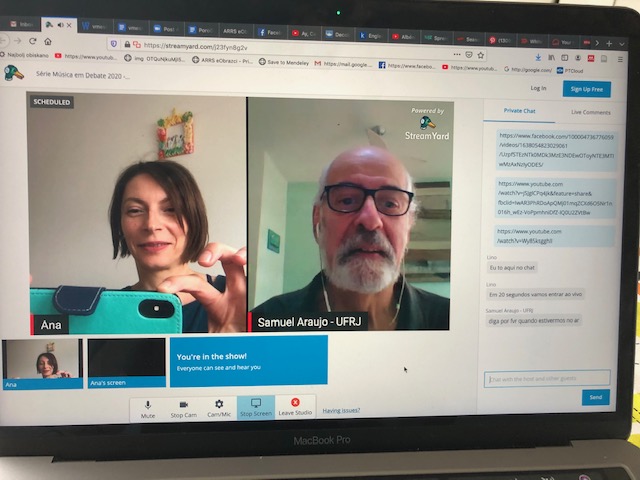Pavao Markovac was a musicologist, publicist, critic, political agitator, organizer, and a prominent member of the so-called Croatian left intelligentsia between the two World Wars. His extremely rich political and artistic work within the labor movement regularly, however, remained outside the narrow focus of scholarly debates. To illustrate, Nataša Leverić Špoljarić in the text “Pavao Markovac (1903–1941) – a musical enlightener between two world wars (on the 80th anniversary of his death)” (sic!) almost completely bypasses this part of his work, citing it only as a biographical episode, while other aspects of his work are elaborated in more detail. The reasons for omitting this key aspect still wait to be investigated, but it would not seem wrong to attribute them to historical revisionism, which casts a shadow on many fields and many depictions of left-wing artists and cultural workers of the interwar period. In different encyclopedic entries about Markovac there is only a remark that he wrote about music from a Marxist perspective, which does not show the width, complexity and intertwining of his journalistic, political and artistic work, based on the Marxist tradition. This text does not pretend to completely fill this gap, but to re-initiate the debate introduced by Markovac himself, which is, in short, on Marxist interpretations of music, its production, reception and, finally, it’s role in the society.
Continue reading “Domagoj Kučinić: Pavao Markovac and “Worker’s Music”: not for concert halls, but for meetings and trips”Mojca Kovačič – Creating Atmospheric Coherence through Commemorative Rituals, Singing Partisan Songs, and Rehearsed Affect
The journal Narodna umjetnost has published an article by Mojca Kovačič entitled Creating Atmospheric Coherence through Commemorative Rituals, Singing Partisan Songs, and Rehearsed Affect (https://hrcak.srce.hr/267009). The article presents aspects of affective atmospheres in the context of commemorating the events of the Second World War in post-socialist Slovenia. Particular emphasis is placed on the role of partisan songs in establishing relations between the past and the present, discussed with specific reference to commemorative events and the experiences of singers in a rural choir. Individual narratives revealed the internal dynamics of each singer’s experience while singing partisan songs, as well as the role that collective memory, the past, history, politics, and personal narratives play in that experience. The singers’ experiences also provide the basis for questioning the concepts of coherence within the theory of affective atmospheres.
AffecTalks // Ian MacMillen / Playing it dangerously: belonging, exclusion and tambura sentiment
AffecTalks
Join us for the 1st lecture in the AffecTalks series
Ian MacMillen
Playing it dangerously: belonging and exclusion and the tambura sentiment
November 16, 2021, 11:00-12:30 CET
Zoom: https://cutt.ly/qTabLAF
Ian MacMillen will present on his recent monograph, Playing It Dangerously (Wesleyan University Press, 2019). The book offers a new way to understand music and race, demonstrating how structures of belonging as well as exclusion arise as musicians’ feelings conflict with their discourses of diversity and inclusion. Based on fieldwork in Croatia, Serbia, Austria, and the U.S., it examines music’s affective mobilization beyond conscious thought, arguing for the centrality of material processes to the racialization of sentiment in tambura music. This genre-crossing practice serves as a site of both contestation and reconciliation for Croats, Roma, and Serbs since Croatia used it as a national symbol during the 1990s wars. The book demonstrates the dialectical dynamic between affective and discursive responses to differences in playing style, and how the denial of feeling ultimately helps to privilege ideas of tambura players as heroic male Croats, even as the music engenders diverse ethnic, racial, and gendered becomings.
Ian MacMillen is Lecturer in Music at Yale University and, for the Fall 2021 semester, a Fulbright Scholar in Bulgaria with a lectureship at New Bulgarian University. He previously directed the Center for Russian, East European & Central Asian Studies at Oberlin College & Conservatory, where he taught courses in Ethnomusicology and East European Studies. His research focuses on popular and traditional musics of Southeast Europe, with concentrated fieldwork projects in Eastern Croatia, Vojvodina (Serbia), and Sofia, Bulgaria. In addition to a monograph on tambura Music in Croatia (Wesleyan University Press, 2019), his research appears or is forthcoming in publications such as Ethnomusicology Forum, Ethnomusicology, Hrvatski Tamburaški Brevijar, and the Oxford Handbook of Slavic Folklore. His current book project on music, memory, and forgetting has been solicited by the University of Chicago Press.
AffecTalks lecture series is organized within the project “Music and politics in the post-Yugoslav space: toward a new paradigm of politics of music in the 21st century”, financed by the Slovenian Research Agency (J6-9365).
Project team at Loud Memories, Turbo Folks: Mapping Sound, Image and Remembrance in the Post-Yugoslav Space
Two days in mid-September, the 16 and the 17, were an opportunity to hear a number of excellent presentations by a diverse group of researchers at the Loud Memories, Turbo Folks: Mapping Sound, Image and Remembrance in the Post-Yugoslav Space International Symposium September.
The symposium, attended by our project team members, was driven by the desire to engage with the question how images, sounds, and memories (re)invent traditions, histories, and spaces of political intervention? The organisers, the Center for Cultural and Religious Studies, Faculty of Social Sciences, University of
Ljubljana (CPKR, FDV (UL)), and the MGLC – International Centre of Graphic Arts, forwarded the question of what are the cultural dynamics and the affective charges of the post-Yugoslav condition? How do they travel across various media and across the borders of various posttransitional peripheries?
Continue reading “Project team at Loud Memories, Turbo Folks: Mapping Sound, Image and Remembrance in the Post-Yugoslav Space”Tanja Petrović: From Noise to Voice. The Work of Sonic Affect amid Industrial Debris
On the website https://soundcloud.com/markotadik/sets/13-pieces-for-prvomajska one can listen to the sound installation by artists Marko Tadić and Miro Manojlović “Concrète machines: 13 pieces for Prvomajska”. These sound pieces have been used at the exhibition in the framework of The Second Biennale of Industrial Art in Istria under the title “On the Shoulders of Fallen Giants.” The installation was placed in the cinema hall in Raša, a small mining town, known as the youngest town in Istria: it was built in 1936 and 1937 to be home of miners and their families. The mines were closed only 30 years later, and the town is today just a monument to mining life and labor. The cinema hall also lost its function – its interior is emptied of seats and void of function. It is just one among many empty, ruining buildings in this town, built by Italians during their administration in Istria. The town that was carefully conceptualized to cater the needs of its inhabitants, for a long time already stands still, bond with the past, as a monument to a bygone era, and as a ruin of the imagination of the future that industrialization used to embody.
Mojca Kovačič: “Recording bracelets” a methodological tool for ethnography of affect
The empirical study in which we focus on the affective and emotional potential of music in shaping political collectivities also involves fieldwork at selected communal events, such as official and unofficial commemorations, festivals, protests. In addition to autoethnography, on which researchers of affective and emotional states often base their approach, we are primarily interested in the singing and listening experiences of active participants. Of course, a question immediately came up: How to capture those momentary states or bodily responses to music performance (before, during or after the event)? We wanted to collect data on an individual’s bodily experience, but we didn’t opt for a neuroscientific approach. Namely, we see such an approach as limited, as it often neglects previous experiences or histories of performance and listening involved in “current” bodily reactions (see Martin 2013). However, we don’t deny that a combination of the two would also contribute to our approach.
First online seminar: Musica em Debate
The online discussion was hosted by Samuel Araujo and several ethnomusicological organizations in Brazil (Ethnomusicology Laboratory and Musiculture Group – Tide, UFRJ, UFPA Ethnomusicology Laboratory composed of the Studies Group on Music in Pará, Research Group on Music and Identity in the Amazon, both from UFPA, and the Studies Group of Music in the Amazon, from UEPA).
Catherine Baker: The space of an embrace: Eurovision’s affective communities in lockdown
Shortly after lockdown in Italy began, Italian apartment-dwellers started joining in co-ordinated singing from their balconies, including the song that had just won the Sanremo Music Festival and was still officially Italy’s entry for the 2020 Eurovision Song Contest. When it became clear that that too would have to be cancelled, Eurovision fans rallied together on social media to bind their sense of community back together by watching past contents online. Continue reading “Catherine Baker: The space of an embrace: Eurovision’s affective communities in lockdown”
Martin Pogačar: Futures of a clandestine recording: a song as a mnemotechnical device
A couple of years ago I was browsing YouTube videos when a video popped of a 1941 recording of an old Slovenian choir song Lipa zelenela je (“The linden tree grows green”). I knew the song only too well. It was a ubiquitous sonic feature of my growing up in the socialist Slovenia/Yugoslavia, part of choir repertoires, and a popular funeral song (as it is today). Hence it was generally disliked at the time by myself and my peers, and also became a matter of pop musical reinterpretations. Lačni Franz, for example, took the title and ironicised the funeral motive in his reinterpretation of the song. However, I hardly knew anything about the 1941 recording that, found on YT about 75 years later, shows two images, one of a map of occupied Slovenia during the Second World War (1941–1945) and another of Ljubljana under fascist occupation (1941–1943).
Lipa zelenela je. 1941 performance. Source.
Rajko Muršič: Everyday communism in Slovenian grassroots and underground music venues
We live in deeply paradoxical times. Everybody has access to more music than ever, but at the same time music is becoming less and less powerful as a social activity. Music – especially popular music – does still affect society, but not the way it did decades ago. All around the western world, music venues are rapidly disappearing or barely surviving at the margins. Pocket loudspeakers occasionally disturb social “peace”, but earphones seem to inscribe definite symbolic boundaries in everyday reality, at home and in public.
Still, music’s basic appeal has not changed, with it being the most effective symbolic practice that catches both the whole body and the mind. It is essentially intimate, social and common at the same time. Live music will not disappear so easily.
In this short post I will present some thoughts related to continuous encounters with various music venues in Slovenia in several capacities – as part of the audience, as an active participant in the establishment and short-term operation of such a venue, as a musician, and, finally, as a researcher. In the 1990s I studied the Rock and Youth Club in the Slovenian village of Trate, which eventually became a dissertation-based monograph.


